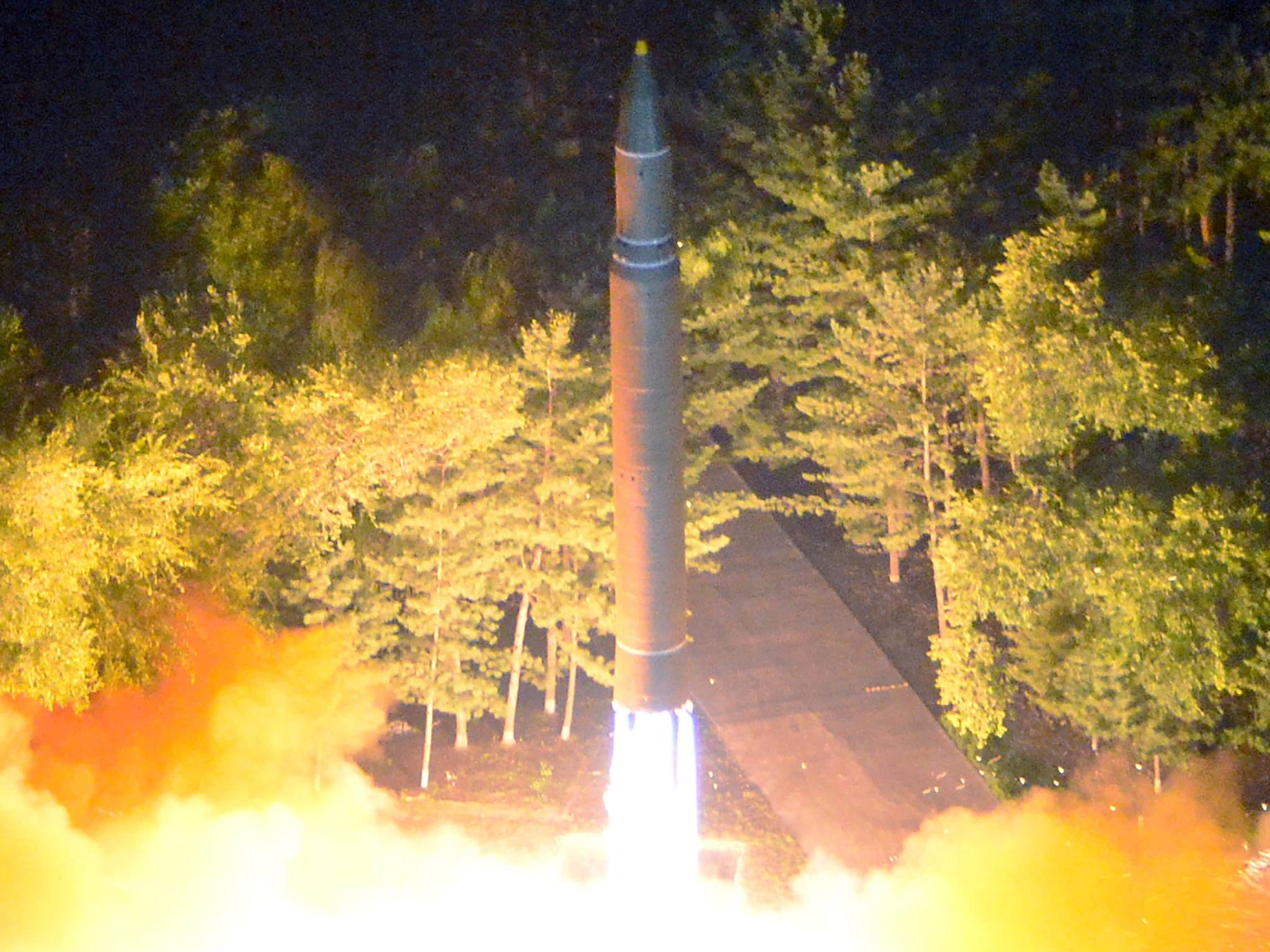UN Security Council votes unanimously to impose new sanctions on North Korea after missile tests
The new sanctions are aimed at countering the threat posed by Pyongyang's nuclear programme following two intercontinental ballistic missile (ICBM) tests in July

Your support helps us to tell the story
From reproductive rights to climate change to Big Tech, The Independent is on the ground when the story is developing. Whether it's investigating the financials of Elon Musk's pro-Trump PAC or producing our latest documentary, 'The A Word', which shines a light on the American women fighting for reproductive rights, we know how important it is to parse out the facts from the messaging.
At such a critical moment in US history, we need reporters on the ground. Your donation allows us to keep sending journalists to speak to both sides of the story.
The Independent is trusted by Americans across the entire political spectrum. And unlike many other quality news outlets, we choose not to lock Americans out of our reporting and analysis with paywalls. We believe quality journalism should be available to everyone, paid for by those who can afford it.
Your support makes all the difference.The UN Security Council has voted unanimously to impose new sanctions on North Korea including banning $1 billion in exports.
The new sanctions are aimed at countering the threat posed by Pyongyang's nuclear programme following two intercontinental ballistic missile (ICBM) tests in July. The United States-drafted resolution comes after weeks of tough rhetoric from the administration of President Donald Trump, with the President himself having recently taken aim at China for supposedly not doing enough to counter the regime of North Korea leader Kim Jong-un.
The US “is taking and will continue to take prudent defensive measures to protect ourselves and our allies” from the threat posed by North Korea, US Ambassador to the United Nations Nikki Haley said after the vote, calling the new resolution "the single largest economic package ever levelled against the North Korean regime." .
The new resolution bans North Korean exports of coal, iron, iron ore, lead, lead ore and seafood. It also prohibits countries from increasing the current numbers of North Korean labourers working abroad, bans new joint ventures with North Korea and any new investment in current joint ventures.
It adds nine individuals and four entities to the U.N. blacklist, including North Korea's primary foreign exchange bank, subjecting them to a global asset freeze and travel ban.
But Ms Haley said that more needed to be done by the international community.
“We should not fool ourselves into thinking we have solved the problem. Not even close. The North Korean threat has not left us, it is rapidly growing more dangerous,” Ms Haley said, adding that "further action is required" and that Washington would continue annual joint military exercises with South Korea.
North Korea has accused the United States and South Korea of escalating tensions by conducting military drills.
North Korean ally China and Russia both slammed the US deployment of the THAAD anti-missile defence system in South Korea. China called for a halt to the deployment and for any equipment already in place to be dismantled.
“The deployment of the THAAD system will not bring a solution to the issue of (North Korea's) nuclear testing and missile launches,” China's UN Ambassador Liu Jieyi told the Security Council after the vote. Mr Liu also urged North Korea to “cease taking actions that might further escalate tensions.”
Russia's UN Ambassador Vassily Nebenzia said sanctions should be used as a tool for engaging Pyongyang in talks and that creative new approaches were needed to address the issue.
He said he hoped recent remarks by US Secretary of State Rex Tillerson “were sincere - that the U.S. is not seeking to dismantle the existing (North Korea) situation or to forcibly unite the peninsula or to militarily intervene in the country.”
While the Security Council has been divided on how to deal with other international crises like Syria, the 15-member body has remained relatively united on North Korea. Still, negotiating new measures typically takes months, not weeks.
North Korea has been under UN sanctions since 2006 over its ballistic missile and nuclear programmes and the Security Council has now ratcheted up the measures in response to five nuclear weapons tests and four long-range missile launches.
The United States negotiated with China for a month on the latest resolution, before expanding negotiations to the full 15-member council on Friday. President Trump has been frustrated that China has not done more to rein in North Korea. Washington has threatened to exert trade pressure on Beijing and impose sanctions on Chinese firms doing business with Pyongyang.
But Ms Haley thanked China for its “important contributions” to the resolution. “These sanctions will cut deep and in doing so will give the North Korea leadership a taste of the deprivation they have chosen to inflict on the North Korean people,” she said.
Ms Haley was not the only Trump administration to address the issue of North Korea with Mr Trump's National Security Adviser HR McMaster stressing that it was “impossible to overstate the danger” posed by North Korea.
In an interview with MSNBC earlier on Saturday, Mr McMaster said Mr Trump has been “deeply briefed” on the strategy on North Korea.
Mr McMaster reiterated the administration's position that all options, including a targeted military strike, are on the table. Still, he acknowledged this “would be a very costly war, in terms of —in terms of the suffering of mainly the South Korean people.”
He added: “So what we have to do is — is everything we can to — to pressure this regime, to pressure Kim Jong-un and those around him such that they conclude it is in their interest to denuclearise.”
Reuters and Associated Press
Join our commenting forum
Join thought-provoking conversations, follow other Independent readers and see their replies
Comments